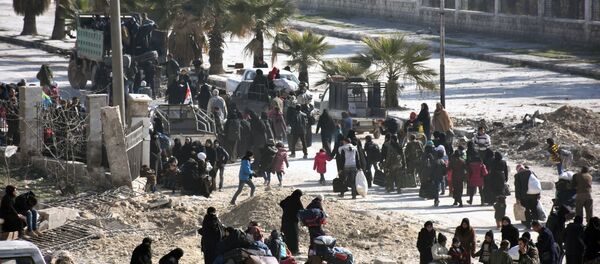On Saturday, negotiators from the Friends of Syria Group met in Paris to discuss a new ceasefire in Aleppo. The meeting was attended by foreign ministers and top diplomats from France, Germany, the United Kingdom, Italy, the United States, Turkey, Saudi Arabia, the United Arab Emirates and Jordan.
Speaking to reporters at the close of the meeting, German Foreign Minister Frank-Walter Steinmeier said that the negotiating group "will not leave Aleppo. We will do everything in our power to find a solution and use all means at our disposal, a ceasefire and humanitarian aid. We hope that this will allow us to proceed to a truce and political settlement talks."
Meanwhile, the High Negotiation Committee, a collection of Saudi-supported militant groups in Syria which Western countries consider moderate also announced that they were prepared to resume negotiations without any preconditions.
On Sunday, the Russian Foreign Ministry denied reports that Moscow and Washington had reached an agreement to allow militant fighters to freely leave the besieged eastern portion of Aleppo. Deputy Foreign Minister Sergei Rybakov also confirmed that Saturday's Russia-US expert level meeting on Syria in Geneva had not yielded any agreements, and that progress in negotiations remains slow.
Earlier this month, Russia and China vetoed what they said was a 'counterproductive' UN Security Council resolution calling for an immediate seven-day ceasefire in Aleppo.
Commenting on the situation, Gevorg Mirzayan, a political science professor at Moscow's Financial University, pointed out that the fundamental misunderstanding between negotiators stems from the fact that the West and the Gulf states refuse to admit that their side has lost.
The Syrian government and Russia are not averse to negotiations, Mirzayan stressed, but at this point, only if these negotiations are about the terms of surrender. "As a rule, the Kremlin and Damascus do not refuse and have never refused to negotiate with the 'moderate opposition'. They're just asking to properly define the status of these discussions," the expert said.

"If a year and a half ago they could be conducted on an equal footing, now the opposition must accept its role as the losing party," Mirzayan added.
"But there certainly cannot be any cessation of hostilities on the condition of maintaining the status quo, or empty talks for the sake of talks, which is what the militants are now factually offering," the analyst emphasized. "Syrian authorities are not interested in freezing the conflict, but in ending the civil war in their country, and Russia [is interested in] the end of its Syrian campaign as soon as possible."
That, Mirzayan stressed, is why the Syrian government and its allies must achieve maximum success in Syria before January 20, "so as to then sit down with the US" at the negotiating table "and arrange the end of the Western campaign in Syria. Trump has already talked about this…"

The academic noted that "even European media now understand the absurdity of Western proposals, who have criticized them not only as unrealistic, but also inhumane. Some media, including Britain's The Independent, are saying openly that demanding that Assad agree to a ceasefire is now unnecessary, not just for Syria's benefit, but for that of the whole world, since it would mean the end of the civil war, a stop to the death and destruction, and a decrease in the flow of refugees to Europe."
Of course, this is something that the Obama administration understands, but they are acting according to their own logic, Mirzayan suggested. "American analysts are saying that if the US stops supporting the opposition now, they will lose the remnants of their influence over them and, accordingly, will lose any negotiating leverage whatsoever in the Syrian conflict."
Furthermore, the logic goes, the loss of US support to militants in Aleppo and throughout Syria would result in an open alliance between the latter and terrorist groups such as Nusra and Daesh (ISIL), which in turn would be "a stain on the reputation of the entire State Department and other officials in the administration."
The US is also concerned that halting the provision of support to militants will 'ruin the US's reputation' among allies in the Middle East, including their drive to 'contain' Iranian influence. "In this situation, a number of Sunni states may come to the conclusion that their US security guarantees are unreliable, and may look for other sources – be they China, Russia, or nuclear weapons," Mirzayan noted.
Ultimately, the analyst stressed that "Syrian forces have suspended their offensive in Aleppo in order to allow the remainder of civilians living in territory controlled by the militants to exit…and to give the fighters a bit of time to negotiate surrender (an opportunity already used by hundreds of opposition members). After that, the offensive will continue."






